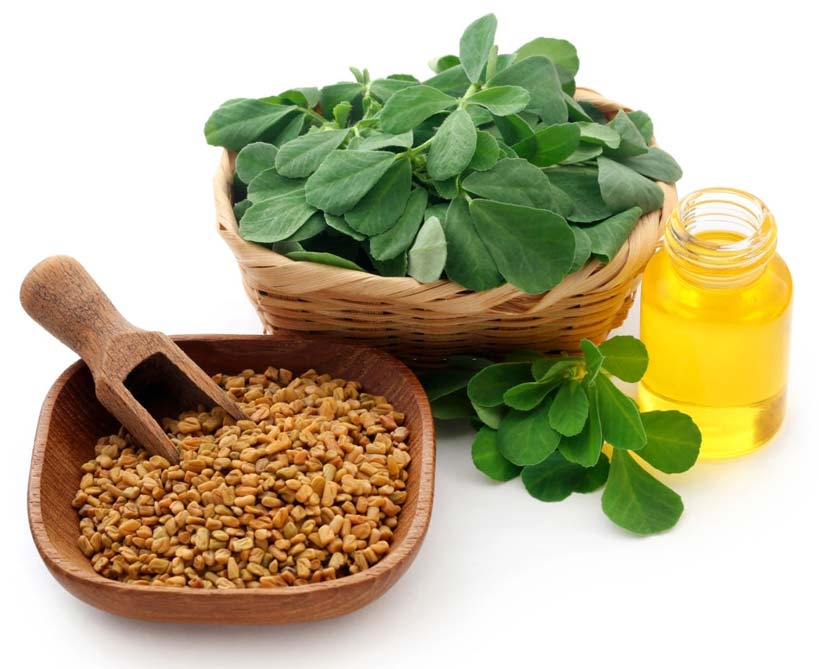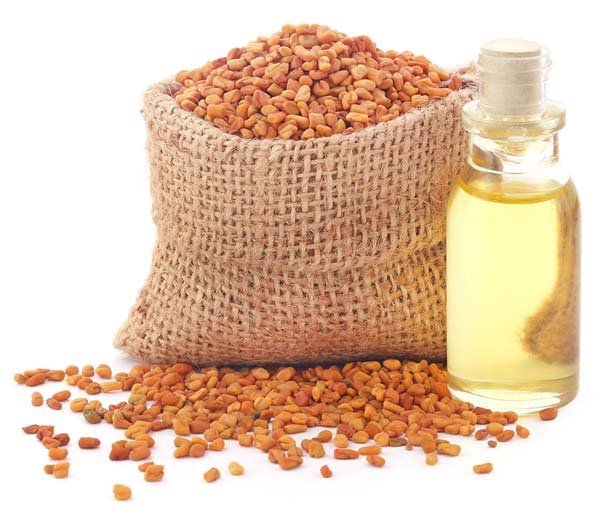A need-to-know woman secret! The 100% natural oil obtained from the ancient herb Fenugreek has a wide range of health benefits. How women in particular can take advantage of its healing properties.
The healing properties of fenugreek was used in Ancient Egypt to treat burns, stimulate childbirth and embalming mummies. Hippocrates, as early as 500 BC, used fenugreek seeds to treat many ailments. The seeds were once taken by gladiators and Greek athletes to gain strength and to whet appetite. Even Charlemagne grew fenugreek, using it as a remedy for baldness.
One of the words for fenugreek in Hebrew and Aramaic ‘rubya’ resembles the word that means “to increase in merit.” However, you may know fenugreek by one of its many other names, such as hay fenugreek, shambhala, chaman, fenigrek grass or camel grass, Greek hay or Greek clover, bird’s foot, hu lu ba, hilbeh, helba, trigonella or bockshornklee – many names, one legend!
Let’s take a closer look at the fenugreek plant and fenugreek seeds. Let’s explore the amazing health benefits fenugreek oil can have for typical female conditions.
So what is Fenugreek?
Helba, trigonella foenum-graecum L. or fenugreek, is part of the bean family (Fabaceae).  Fenugreek is native to the Mediterranean region, Southern Europe, and Western Asia. Fenugreek seeds are very popular as a spice and as a cure for different afflictions. While in India Fenugreek leaves are eaten as a vegetable.
Fenugreek is native to the Mediterranean region, Southern Europe, and Western Asia. Fenugreek seeds are very popular as a spice and as a cure for different afflictions. While in India Fenugreek leaves are eaten as a vegetable.
The fenugreek plant grows upright to about 1-2 feet in height on a single stem or may be branched at the stem base. The small oval-shaped leaves are flat and trifoliate, like clovers, their colour brightly green to purple at the edges.  Fenugreek produces solitary pale white or purplish flowers, similar to those of pea. Its seeds grow in yellow, sometimes slightly curved pods. Every pod contains 10 to 20 small, smooth, brown seeds (resembling corn kernels), each divided into two lobes like multi-faceted pebbles. The whole plant exudes a strong, sweet aroma.
Fenugreek produces solitary pale white or purplish flowers, similar to those of pea. Its seeds grow in yellow, sometimes slightly curved pods. Every pod contains 10 to 20 small, smooth, brown seeds (resembling corn kernels), each divided into two lobes like multi-faceted pebbles. The whole plant exudes a strong, sweet aroma.
Dried Fenugreek leaves carry a milder flavour than the seeds. Like bay leaves, they can be used to spice up a dish. The seeds are hard and, as cumin seeds, can be added to any recipe in ground form. Raw fenugreek seeds give off an intense spicy, curry-like scent, which may remind you of the smell of fresh hay, the sweet aroma of burnt sugar or maple syrup mixed with celery. The spicy, slightly bitter taste of fenugreek seeds is converted into a pungent and highly aromatic flavour when gently roasted over low heat. Fenugreek seedlings disinfect and cleanse the blood, kidneys and liver. They stimulate appetite and are recommended for anaemia and physical fatigue.
Fenugreek Oil
The 100% natural fenugreek oil is obtained by cold pressing the seeds, creating a concentrated golden-yellow liquid. This pressing method preserves the abundant amount of vitamins such as thiamin, folic acid, riboflavin, niacin, vitamins A, B6 and C and the concentrated fenugreek oil continue to be a store for the minerals copper, potassium, calcium, iron, selenium, zinc, manganese and magnesium.
Impressive health properties of Fenugreek Oil
Fenugreek oil has a wide range of medicinal uses due to its strong anti-inflammatory properties, it is an excellent remedy in the recovery from physical weakening after illness, it has a calming effect, and is particularly suitable in diseases of the nervous, respiratory and reproductive systems.
The health properties of fenugreek oil are numerous. For centuries fenugreek plays a key role in curing ailments. It’s been used in Chinese and alternative healing methods to treat skin conditions and it is said to have beneficial effects on blood sugar levels due to the amino acids found in Fenugreek that lower the absorption of glucose in the stomach. Other studies have shown a high content of polysaccharides in fenugreek which can lower cholesterol levels. And the incredible amount of fibre in fenugreek can help with constipation.
Fenugreek oil for Women’s Health
Nowadays, health science shows the positive healing effects of fenugreek on typical female organs. All due to the structure and action of diosgenin contained in fenugreek seeds which is similar to the female hormone estrogen.
Fenugreek and PMS
 Premenstrual syndrome (PMS) is a rather common and unpleasant condition that affects emotions, physical health and behaviour in over 90% of menstruating women. The symptoms usually occur 5 to 11 days before menstruation, though disappears once menstruation starts. The cause of PMS might be related to changes in both the female sex hormone and serotonin levels during the first days of the menstrual cycle.
Premenstrual syndrome (PMS) is a rather common and unpleasant condition that affects emotions, physical health and behaviour in over 90% of menstruating women. The symptoms usually occur 5 to 11 days before menstruation, though disappears once menstruation starts. The cause of PMS might be related to changes in both the female sex hormone and serotonin levels during the first days of the menstrual cycle.
Fenugreek oil can be a strong stimulant that promotes the onset of menstruation and contributes to normalize the menstrual cycle. Fenugreek stabilizes female hormone levels and therefore may help to relieve menstrual cramps. Studies show a reduced need for painkillers in participating women with menstrual cramps.
Fenugreek and Menopause
Menopause usually occurs after age 45. During this time hormone production of estrogen and progesterone in the ovaries and the monthly periods will come to an end. Physical changes and symptoms can start several years earlier.  This may include changes in the menstrual periods (shorter or longer, lighter or heavier, less or more time in between), hot flashes, night sweats, difficulty sleeping, vaginal dryness, mood swings, focus problems, hair loss, increased facial hair. Fenugreek oil is the perfect remedy to relieve symptoms and painful side effects.
This may include changes in the menstrual periods (shorter or longer, lighter or heavier, less or more time in between), hot flashes, night sweats, difficulty sleeping, vaginal dryness, mood swings, focus problems, hair loss, increased facial hair. Fenugreek oil is the perfect remedy to relieve symptoms and painful side effects.
Fenugreek for Infertility and Libido
Infertility caused by female hormonal disorders may be promoted by ingesting fenugreek oil. Fenugreek activates the production of phytoestrogens and stabilizes hormone levels. As a pleasant result, an increased libido can be noted as an added benefit.  Research among healthy young women with a low sex drive or whose satisfaction during sexual activity is prevented, has found that fenugreek increase their interest and pleasure in sex.
Research among healthy young women with a low sex drive or whose satisfaction during sexual activity is prevented, has found that fenugreek increase their interest and pleasure in sex.
Fenugreek for male libido – Intake of fenugreek oil by healthy men has been shown to cause an increase of response to sexual stimuli. While the ability and interest in sex seems to improve both in healthy younger men and in older men who are starting to lose interest. Research in male infertility suggests that oral intake of fenugreek oil (three times a day for 4 months) improves sperm count in men with a low concentration of sperm.
Fenugreek after Childbirth and for Lactation
 Women in Eastern countries always have and still use fenugreek after childbirth. Fenugreek promotes in restoring the depleted female body from giving birth. In nursing mothers it improves and stimulates milk secretion.
Women in Eastern countries always have and still use fenugreek after childbirth. Fenugreek promotes in restoring the depleted female body from giving birth. In nursing mothers it improves and stimulates milk secretion.
The best source of natural nutrients for newborn’s development is breastfeeding. In some mothers, certain conditions may cause a shortage of milk production. Fenugreek oil offers a safe and natural alternative to stimulate lactation. Studies in nursing mothers who took fenugreek in the first 14 days after giving birth found an increase in breast milk production and therefore weight gain in their baby.
 Taking fenugreek appears to be most effective when started a day or two after delivery. It is recommended to start with a small amount, increase gradually until the smell of sweat and urine starts to resemble that of maple syrup. Continue intake up to about 20 days.
Taking fenugreek appears to be most effective when started a day or two after delivery. It is recommended to start with a small amount, increase gradually until the smell of sweat and urine starts to resemble that of maple syrup. Continue intake up to about 20 days.
The fragrance emitted is due to sotalon. Low concentrations of this compound has a distinct maple syrup-like odour. Sotalon passes through the body in unaltered form, giving off this smell to both urine and sweat. Ingestion of fenugreek oil shortly before delivery can also cause this unusual scent in the newborn. Fenugreek intake combined with breastfeeding can have the same effect on the infant.
A few important side notes
Fenugreek can cause uterine contractions and therefore should not be taken during pregnancy.
Oral intake of fenugreek by children can potentially be risky. Daily intake of fenugreek oil up to 3 weeks after childbirth should not cause any side effects in infants.
Fenugreek can cause the same allergic reactions in anyone allergic to plants of the Fabaceae (bean) family such as soybeans, peanuts and green peas.
“All remedies weighed on one plate of the scales and fenugreek on the other, will balance the scales!” (English scientist Kleber)
